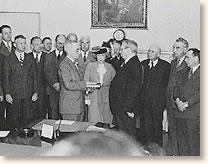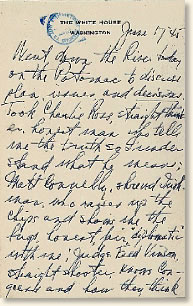|
Thoughts Of A President, 1945
On the afternoon of April 12, 1945, Vice President Harry Truman sat in the Capitol office of House Speaker Sam Rayburn sipping whiskey and talking politics. The conversation was interrupted by a phone call summoning Truman to the White House.
Everyone knew that President Roosevelt's health was bad, and as he drove to the White House, Truman feared the worse. He was immediately ushered to Eleanor
 |
Harry Truman is sworn in
as President at the White House
April 12, 1945 | Roosevelt's second-floor study where the first lady waited. "Harry, the President is dead," she declared as he entered the room. Stunned, Truman responded "Is there anything we can do for you?" She replied, "Is there anything we can do for you, you're the one in trouble now."
That evening, around 7 o'clock, Truman was sworn in as President. He later remarked to reporters "Boys, if you ever pray, pray for me now. I don't know if you fellows ever had a load of hay fall on you, but when they told me yesterday what had happened, I felt like the moon, the stars and all the planets had fallen on me."
A few months later, Truman gathered some close friends and advisors around him and made a short trip along the Potomac in the presidential yacht. An avid diarist, Truman had a keen sense of history and often recorded his activities and thoughts at the end of the day:
"The White House
Washington
June 17, '45
Went down the River today on the Potomac to discuss plan, issues, and decisions. Took Charlie Rose, straight thinker, honest man who tells me the truth so I
 |
| National Archives |
Truman's hand-written diary | understand what he means; Matt Donnelly, shrewd Irishman who raises up the chips and shows me the bugs, honest, fair,'diplomatic' with me; Judge Fred Vinson, straight shooter, knows Congress and how they think, a man to trust, Judge Rosenman, one of the best in Washington, keen mind, a lucid pen, a loyal Roosevelt man and an equally loyal Truman man; Steve Early, a keen observer, political and other wise, has acted as my hatchet man, absolutely loyal and trustworthy, same can be said as about Rosenman.
We discussed public relations in Germany, Italy, France, Holland, Belgium, England
and Russia. Food, fuel, transportation and what to do about it. Japanese War
and the relations with China, Russia and Britain with regard to it, Supreme
Commander and what to do with Mr. Prima Donna, Brass hat, Five Star McArthur
[Truman misspelled MacArthur's name]. He's worse than the Cabots and the Lodges
- they at least talked with one another before they told God what to do. Mc
tells God right off. It is a very great pity we have to have Stuffed Shirts
like that in key positions. I don't see why in Hell Roosevelt didn't order
Wainwright home and let McArthur be a martyr, guess he was afraid of the Sabatoge
Press - McCormick - Patterson Axis. We'd have had a real general and a fighting
man if we had Wainwright and not a play actor and a bunco man such as we have
now.
Don't see how a country can produce such men as Robert E. Lee, John Pershing, Eisenhower, Bradley and at the same time produce Custers, Pattons and McArthurs.
I have to decide Japanese strategy - shall we invade Japan proper or shall we bomb and blockade? That is my hardest decision to date. But I'll make it when I have all the facts.
So you see we talk about more than 'Cabbages & Kings and Sealing wax and things'
They talked of many things Shoes and sealing wax and cabbages and kings."
References:
McCullough, David G., Truman (1993).
How To Cite This Article:
"Thoughts Of A President, 1945," EyeWitness to History www.eyewitnesstohistory.com (1999).
|






